I moved to Eastern Europe over 12 years ago. One of the great things about living here is how much pristine, untouched nature there is. Much of it is even accessible by public transportation (which is great for non-drivers like me).
But camping in Eastern Europe is a lot different than what you’d expect in Western countries. If you are thinking about camping around Serbia, Montenegro, Croatia, Bosnia, Hungary, Romania, Bulgaria, Albania, Macedonia, Greece, or Ukraine, read this first.
Campsites and Wild Camping in Eastern Europe
Camping is definitely not as popular in Eastern Europe as it is in the West. That means it can be hard to find campsites in many countries.
If you do find a campsite, sometimes it is just someone’s field that they’ve turned into a “campground.” Because of this, the services and experiences can vary drastically.
Tip: If no campground is around, you can usually camp outside of “ethnic” restaurants or hotels. They might charge a small fee or even let you stay for free.
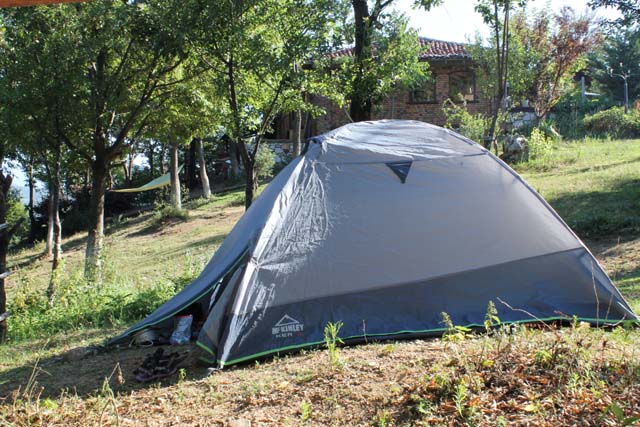
Camping outside of Shtepia Restaurant/Ranch in Peja, Kosovo.
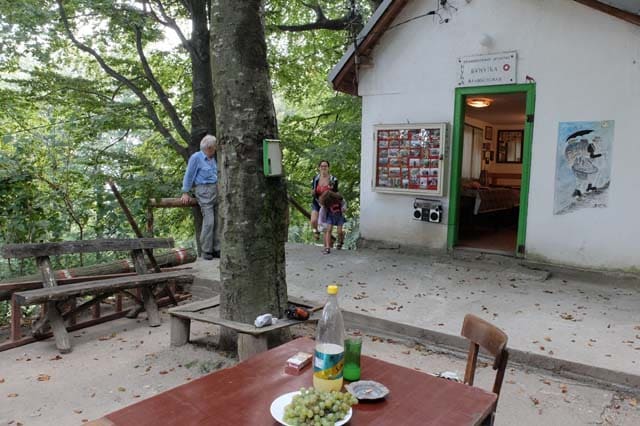
Camping in front of a “mountain hut” in Serbia. Read more about these huts here.
What about wild camping in Eastern Europe?
I rarely stay at a campground when camping in Eastern Europe. It is incredibly easy to wild camp in Eastern Europe.
For the most part, wild camping in Eastern Europe is free. Even if it isn’t technically legal, you will almost never run into problems. The “worst” I’ve experienced is concerned locals who bring us cheese and chocolate out of concern for us. 😀
However, it’s still a good idea to brush up on the laws of wild camping in the country you are going to. You can see a list of the wild camping laws of every country in Europe here.
Also follow these guidelines when wild camping:
- Be discreet. Don’t set up camp right next to someone’s home, a main road, or any commercial businesses.
- Know the fire rules: Making a fire will draw attention to yourself. And, if it’s an area where forest fires are a risk, you will likely get kicked out or fined.
- Follow the rules of Leave No Trace. No one wants to see bits of toilet paper and piles of human shit. Don’t be a jerk. Dig a cathole when going to the bathroom and make sure to pack out your trash. Otherwise locals aren’t going to be so friendly towards wild campers anymore!!!
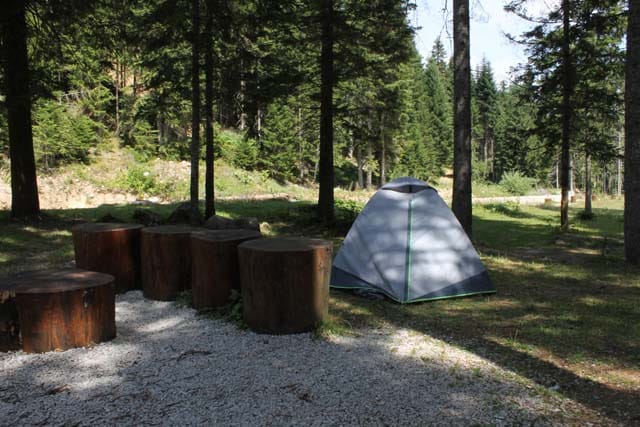
Camping at a picnic spot in Rozaje, Montenegro. Some locals came to hang out there at night and shared beer with me. 😀
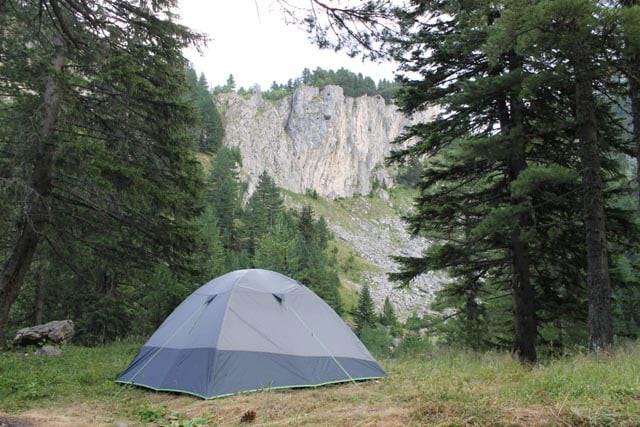
My favorite camping spot in Rugova Gorge, Kosovo
Camping in someone’s yard/field:
People in Eastern Europe tend to be very friendly. They will (usually) gladly let you camp on their land. They might not understand why you choose to sleep in a tent. Don’t be surprised if they offer to let you sleep in their home instead!
A cool thing is that most households in rural or remote areas will have an outdoor sink. You can use it to get water without having to bother them.
If you want to camp one someone’s property:
- Ask permission first. This is fun when you don’t speak the same language! 😀
- Go to the bathroom far off the property. And, again, follow the rules of Leave No Trace.
- Don’t make a fire. I love campfires, but you don’t want to scar their yard with your fire.
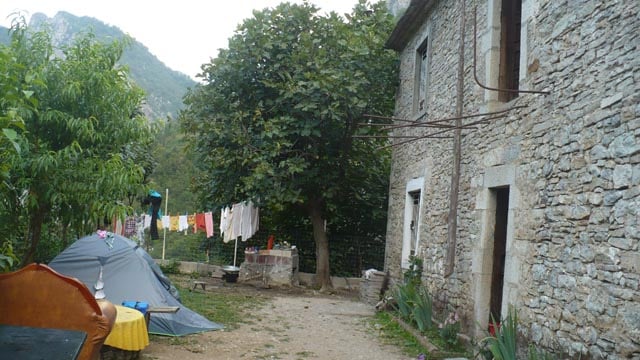
This was an insane camping experience. You have to take a BOAT to get to this family’s house on Koman Lake, Albania.. There is literally no road that goes there. They let me camp in their yard.
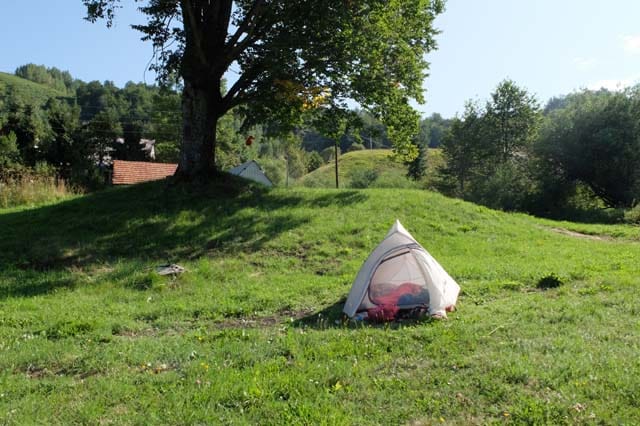
Camping in someone’s yard in Verusa, Montenegro. I made sure to get as far away from the house as possible.
Camping in National Parks
The relaxed rules about wild camping generally don’t apply to national parks. In parks, you will be expected to pay for camping at designated areas. You might be required to get a permit if you want to backpack through the park and overnight camp.
Yes, you could set up stealth camp somewhere within the national park without paying. However, I personally wouldn’t recommend this unless you are very experienced at Leave No Trace.
Why? Aside from the fact that park rangers might find you and give you a fine, the national parks tend to get a lot of visitors. All those visitors put a strain on the ecosystem. By camping outside of designated areas, you are further harming the nature.
I’ve seen too much trash, toilet paper, human shit, and trees limbs cut down for firewood within National Parks in Eastern Europe. So, again, unless you are really going to respect Leave No Trace, don’t wild camp in our parks!
What to Expect Camping in Eastern Europe
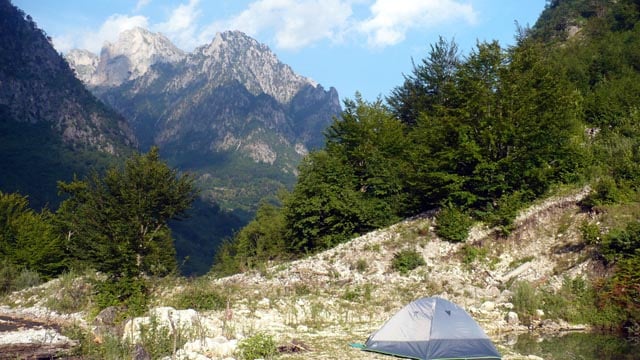
Valbona, Albania
Hiking and camping is starting to get more popular in Eastern Europe, but it is still not anywhere close to what it’s like in Western countries. Because of this (and because our corrupt politicians aren’t putting any more towards nature preservation), you aren’t likely to find basic services in wild areas.
When hiking, you probably will NOT find:
- Bathrooms or outhouses
- Clean drinking water
- Trash cans
- Reliable trail maps
- Park rangers who can assist you
For example, when I went camping in the Valbona area of Albania, a local woman and her husband who run a campsite actually made the trail maps. They were also the ones going over the trails each year to check on the markers. It’s awesome that they took the initiative to do this. But it’s also sad that locals have to do this.
Oh, and if you do manage to find a trail map, remember to check the date it was made. Once I went camping in Mrtva Canyon in Montenegro. I managed to find a contour map online. After getting pretty lost trying to follow the map, I noticed that the map had been made in 1988! Needless to say, the map was out of date.
Gear to Bring
Because you won’t find things like bathrooms, trash cans, or trail maps when camping in Eastern Europe, you’ll need to bring certain gear.
Bring this gear even if you are staying at a campground. Why? Because if you hike anywhere, you will still need these things.
- Trowel: For digging a cathole when going to the bathroom.
- Trash bags: If you carried it in, carry it out!
- Water filter: My Sawyer Mini water filter is one of the best things I’ve ever bought. It removes bacteria, protozoa, etc. from water so it is safe to drink. I can drink water from streams, lakes, or even puddles.
- Rope: Absolutely hang your food in trees and NEVER leave food in your tent! Aside from bears, there are other animals who will try to eat your food. Here’s how to hang a food bag when camping.
- Satellite navigator: This isn’t completely necessary. But remember that good trail maps are hard to find and there probably aren’t any park rangers who will be able to help you.
*I suggest reading this Hiking Checklist to make sure you don’t forget anything.
Wild Animals in Eastern Europe
Yes, there are some dangerous wild animals that you need to be aware of when camping in Eastern Europe. Here’s a rundown:
Snakes

Here’s a viper that I encountered while camping in Eastern Serbia.
There are two types of venomous viper snakes in Eastern Europe. Yes, these can kill you if you don’t get medical help soon enough! I personally have seen these camping in Serbia, Montenegro and Bulgaria multiple times.
To stay safe, find out:
- Where the closest clinic is
- Wow to say “snake” in the local language
- What to do if you see a snake
- What to do if you get bitten by a snake
Bears
Unlike in the USA (where bears regularly go towards campgrounds to get at the food), bears in Eastern Europe are mostly scared of people. Unless you are way in the deep wilderness, you probably won’t encounter a bear while camping in Eastern Europe.
However, there are exceptions. Romania has a lot of brown bears. The number is over 5,000! By comparison, Slovakia has around 1,000 bears and Ukraine has around 200 individuals.
Because a lot of (idiotic) people feed the bears, the bears aren’t even scared of people. My friends recently went to the Transfagarasan region and easily spotted several bears along the road. They weren’t camping, but I wouldn’t be surprised if bears came right to campsites in that region.
Also read: Bear Safety when Outdoors
Wolves
Like with bears, wolves have mostly learned to avoid people. So, you don’t need to be too concerned about wolves in Eastern Europe. However, that doesn’t mean you shouldn’t be cautious.
According to Wikipedia, here are the Eastern European countries with the most wolves:
- Romania: 2,500 wolves
- Belarus: 1,500-2,000 wolves
- Ukraine: 2,000 wolves
- Bulgaria: 1,200-1,500 wolves
- Greece: 1,020 wolves
- Macedonia: 1,000 wolves
- Serbia: 500 wolves
- Bosnia: 400 wolves
- Macedonia: 250 wolves
- Croatia: 200 wolves
*Note that wolves are very dangerous in certain countries like Kazakhstan. The wolves hunt close to civilization to get sheep.
How do you stay safe when camping in wolf country?
- Never keep food in your tent.
- Keep camp clean.
- Keep children within sight
- If you see a wolf and it doesn’t back away, raise your hands, make lots of noise, and throw rocks. Don’t wait until the wolf gets close to do this.
- If the wolf approaches, back away slowly. Do not turn your back towards a wolf. NEVER RUN.
- Keep dogs on the leash, especially if you spot a wolf.
- Carry bear spray or pepper spray
Stray and Feral Dogs
Dogs are actually a huge problem in Eastern Europe. Some are particularly aggressive and I admit I’m terrified of them. Since I know they can “smell my fear”, it just makes me more scared!
It’s best to avoid stray dogs as much as possible. If you do feel threatened or get attacked, there are tricks you can use like throwing rocks towards them or spraying them in the eyes with deodorant.
Read: What to do if you see feral dogs
Cows
Okay – cows probably don’t top your list of “dangerous” animals. But cows actually kill more people per year than bears, wolves, or snakes.
On a recent camping trip in Montenegro, our gear was actually attacked by cows! Everything turned out okay, but the trip could have been ruined or we could have gotten injured if we didn’t follow some basic safety protocols.
Read about it in this post Attacked by Cows while Camping.
Safety (Hitchhiking, Theft, Women Travelers)
Eastern Europe gets a bad rap for being unsafe. When I first started traveling in this area, people warned me that gypsies would steal from me. Or that the police would try to rob me.
Well, in my 15+ year’s experience traveling around here – much of it done hitchhiking as a woman alone – I haven’t had any problems (knock on wood). I even hitchhiked with my 5 year old daughter.
Gypsies? Yes, they do beg in many countries. And they might pickpocket you in public transport. But I personally found Western Europe to be more threatening than anything I found in Eastern Europe. My personal theory is that the huge amounts of income inequality in the West make people more bitter. Also, the people in Eastern Europe are generally too poor to develop serious drug addictions.
*Btw, the politically correct term for gypsy is Roma. They are an ethnic group that faces serious discrimination despite the fact that they’ve contributed vastly to the culture…
Other Tips
Camp Stoves and Fuel
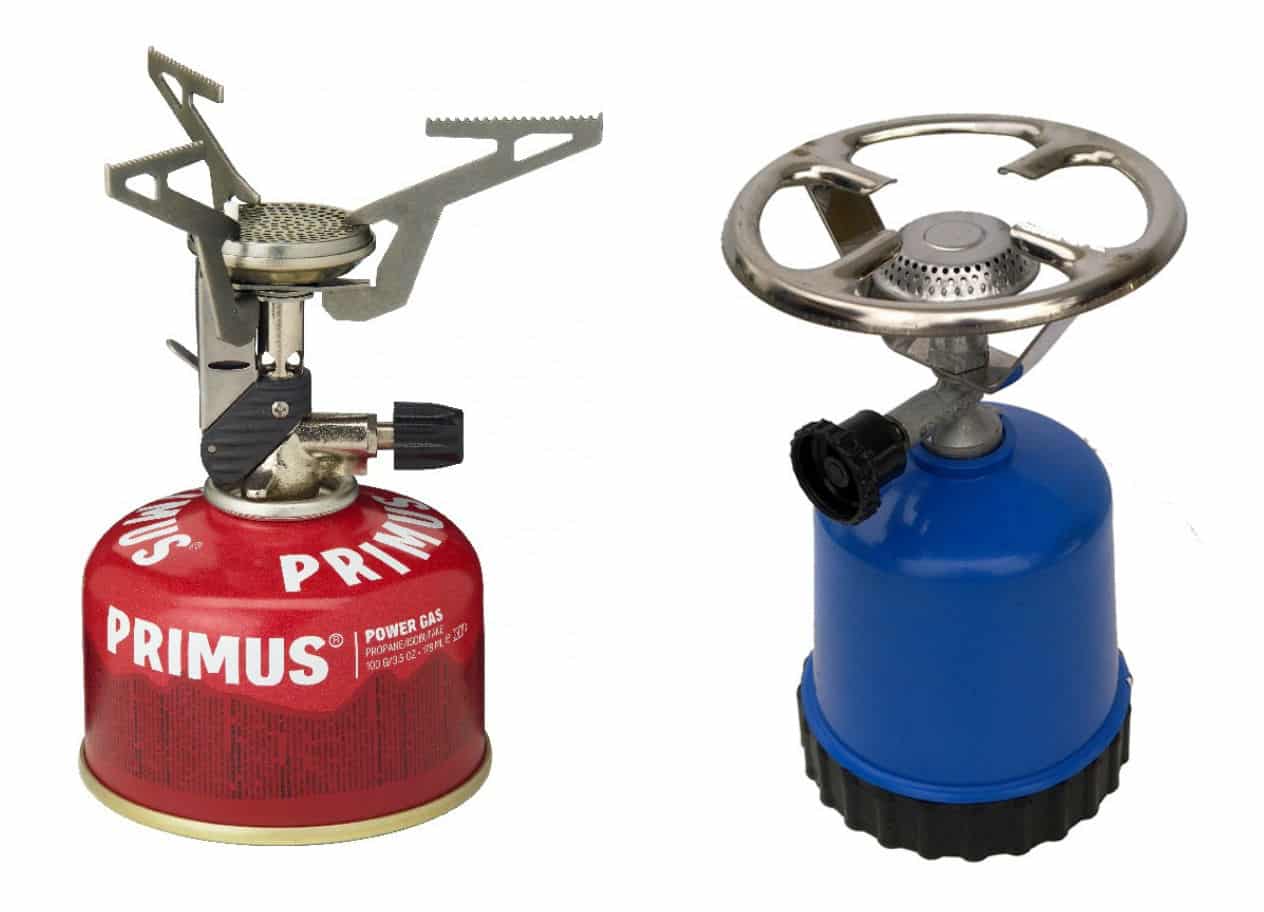
On the left is a stove which uses screw-on canisters. The stove on the right uses puncture-type canisters that you can easily find in Eastern Europe.
I use a gas canister backpacking stove. The stove screws on to a gas canister. The gas is good quality and lasts a really long time. However, these gas canisters can be very difficult to find in Eastern Europe. You definitely won’t find them in smaller towns!
Even in bigger cities, the canisters can be hard to find. For example, there are only two stores that I know of in Belgrade that sell gas canisters.
By contrast, you CAN find these cheap puncture-type gas canisters almost anywhere. Even in remote villages, the local store will almost always sell the gas canisters. They are cheap: about 1 euro each. The downside is that the stoves are really big and bulky, and that the canisters run out quickly.
- If you use screw-top gas canisters, make sure you have enough for your entire trip.
- Otherwise use the puncture-type gas canisters. They run out faster but you’ll actually be able to find refills.
Food
If you are doing hardcore backpacking in Eastern Europe, plan your meals well. It may be harder than you’d think to find food resupplies.
For example, I usually eat oatmeal for breakfast when camping. On a camping trip to Albania, I went into town to resupply. Surprisingly, I couldn’t find oats in any of the stores!
Likewise, it can be hard to find things like canned beans, decent bread, instant meals, vegetarian foods, and other foods you might want to eat while camping.
Camping Near Beaches
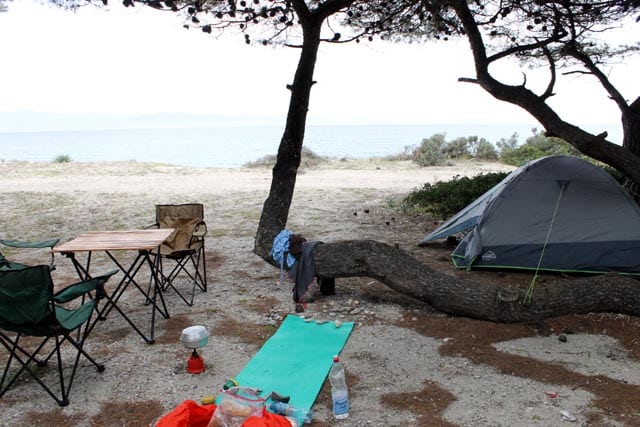
Wild camping on the beach during the Greek off-season
Wild camping near beaches in Eastern Europe is very difficult. Most of the coastal areas have been taken over by cafes and hotels, so you won’t find many discreet areas.
Since the coastal areas make their money off of tourists, they aren’t going to be so happy about you trying to camp for free either! So, be prepared for fines if you get caught wild camping on a beach.
In my experience, the campgrounds at beaches are really terrible, gross, and overpriced. There are some exceptions. I loved camping at Gjipe beach in Albania, for example.
I have friends who wild camp all around Greece. They are only able to do it this way: They drive around and explore all day. Then, when night falls, they quickly put up their tents in a discreet area. They take the tents down immediately in the morning.
I did go free camping in Greece once – but it was off-season. I definitely couldn’t have done that in the peak season.
Land Mines in Bosnia and Croatia
There are an estimated 80,000 unexploded land mines in Bosnia left over from the 1992-1995 war. Since the war ended, 1,750 people have been injured from stepping on these mines and over 600 of them were killed.
The situation is also bad in Croatia. An estimated 31,000 land mines are unexploded there.
As someone who used to live in Bosnia, I personally believe the land mine warnings are overstated. The warnings make it sound like you could die while walking down a hiking path. If there is a path, then obviously someone or something (cows, for example) have walked there since 1995. It’s highly unlikely that you’d be injured.
However, if you go into an overgrown field or other area where no one has walked in a very long time, there could be land mines.
The bottom line? Don’t walk through overgrown areas when camping or hiking in Bosnia and Croatia!
Want to share your own experiences of camping in Eastern Europe? Let us know in the comments section below!
Resources:
http://www.env.gov.bc.ca/bcparks/explore/misc/wolves/
https://www.conservationnw.org/tips-for-hiking-in-wolf-country/
http://westernwildlife.org/gray-wolf-outreach-project/wolf-saftey/
https://wilderness-society.org/bear-in-ukrainian-carpathians/
https://en.wikipedia.org/wiki/Minefields_in_Croatia
https://www.abc.net.au/news/2017-10-15/bosnia-may-never-be-clear-of-land-mines/9029692
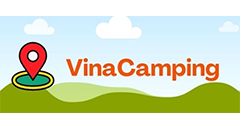

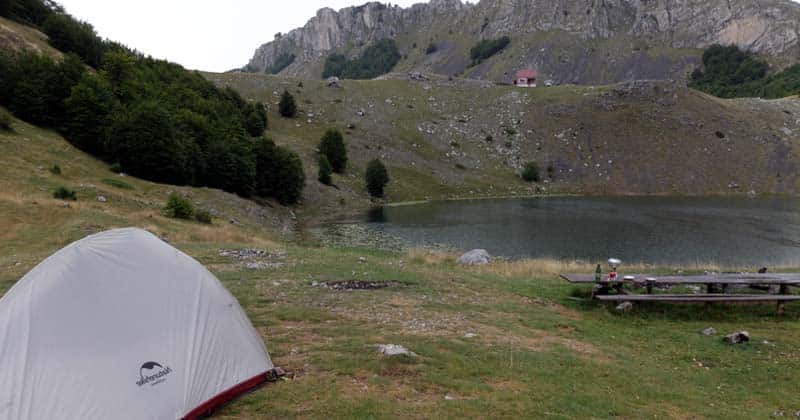

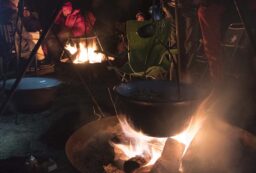
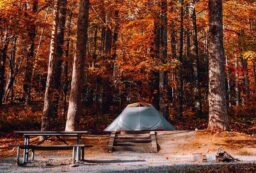
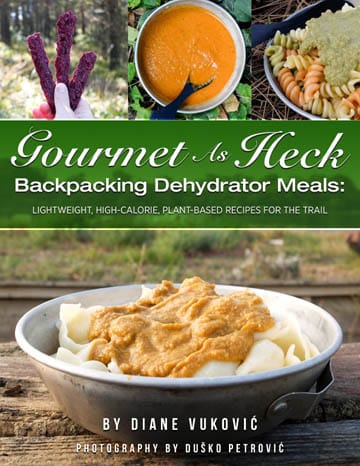
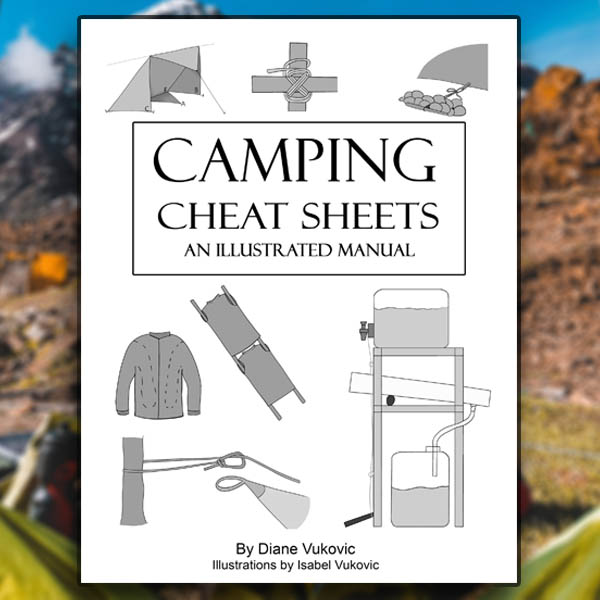


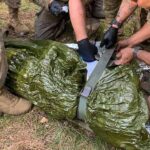
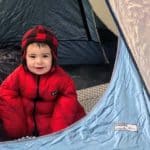
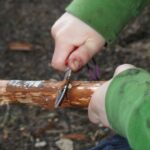
Post your comments